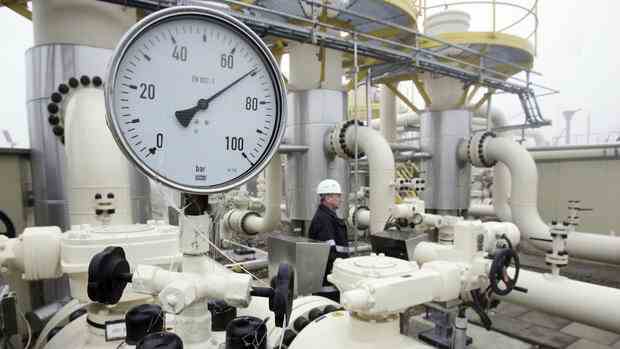Macquarie gets out of the gas network operator Open Grid Europe – the Belgian Fluxys takes over the 24 percent of the shares.
(Photo: dpa)
Frankfurt The Belgian long-distance gas network operator Fluxys is taking over 24 percent of the gas pipeline provider Open Grid Europe, which is primarily active in western Germany. The shares previously belonged to Australian infrastructure investor Macquarie. The companies did not give details of the purchase price on Friday. According to financial sources, the company was valued in the deal at almost six billion euros including debt, which corresponds to almost 1.5 times the property, plant and equipment.
Fluxys sees itself and Open Grid Europe as pioneers in decarbonization solutions, actively developing hydrogen and CO2 infrastructures. The pipelines are currently being expanded and could be converted to hydrogen streams in the future, Fluxys said.
Open Grid Europe operates a 12,000 km gas network in Germany. The company has been less dependent on Russian gas than many of its competitors and is currently benefiting from the switch to liquefied natural gas (LNG), which ships to Dutch ports.
Although fossil fuels in particular currently flow through the gas network, this should also play an important role in the energy transition. Because the network can be converted to hydrogen, which could be generated with wind power from northern Germany, for example. In this way, green energy could be used throughout Germany.
Top jobs of the day
Find the best jobs now and
be notified by email.
The federal government has big plans to build such a dedicated hydrogen pipeline network. The nationalized gas company Sefe (formerly Gazprom Germania) wants to set up its own hydrogen network, in which other network operators should be able to participate.
Eon sold Open Grid Europe in 2012 for 3.2 billion euros
A consortium of investors around Macquarie had bought Open Grid Europe from the energy company Eon in 2012, at the time for 3.2 billion euros. In addition to the 24 percent that Macquarie took over, 32 percent went to British Columbia Investment Management, 25 percent to the Abu Dhabi sovereign wealth fund and 19 percent to Munich Re. The co-investors had a right of first refusal when selling the Macquarie shares to Fluxys, which they did not exercise. The sales process began a year ago, but the energy crisis resulting from the war in Ukraine disrupted the schedule. The final closing of the deal is expected for next March.
There have been a number of gas network deals in Germany in recent years. The prospect of switching to hydrogen makes gas network operators more interesting for investors who are otherwise reluctant to invest in fossil fuels such as coal, oil and gas.
In 2021, for example, Macquarie bought the gas network operator Thyssengas with its 4400-kilometer pipeline network for 1.4 billion euros. In the same year Versicherungskammer Bayern acquired the competitor Ferngas for 720 million euros. In addition, Uniper had started preparations for the sale of its Opal gas pipeline worth around 1.5 billion euros, but stopped the project after the outbreak of the Ukraine war. The importer of Russian natural gas was nationalized after a record loss of 40 billion euros.
More: This is what the future of Uniper and Sefe could look like

